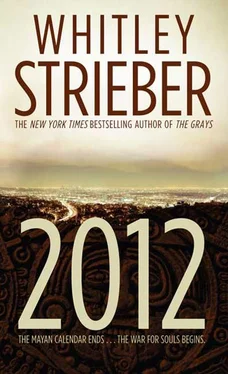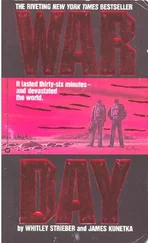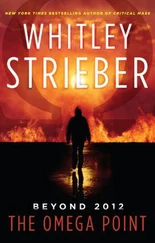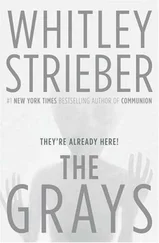Martin had seen some of the people who’d been disensouled, as the media had called it when the media still existed, a cluster of six of them ragged on the roadside, stragglers up all this way from the Garland, Texas attack that, for America, had signaled the beginning of the nightmare. They’d been walking in a rough line. They were filthy and stinking, sewer drinkers, carrion eaters, muttering and growling to each other as they shuffled aimlessly along, aware, perhaps, of some loss, but no longer understanding what it was.
He had stopped his car because he hadn’t been able to resist at least observing them from a little closer, despite the Homeland Security warnings. They hadn’t seemed dangerous at all. Far from it. Up close, they were more like migrating elk or something.
He’d spoken to them. Nothing. There had been two men, three women, some children, one on the back of one of the men, the others hand in hand with their mothers. He’d walked beside them, touched a woman’s shoulder, and asked her, “Could you tell me your name?”
She had turned to him, and what had happened was the most dreadful thing—she had smiled at him. But such a strange, strange smile. All wrong—so bright that it was empty. Not cruel at all, but relentlessly innocent, like the smiles of poor Jim Tom Stevens had been when they were kids. Jim Tom was retarded, though, and he had not had the feeling that these people had been made stupid.
No, it was much stranger than that. They had not lost their intelligence, but rather their information, and not how to count or how to read—oh, no, the information they had lost was much deeper. What they had lost was what distinguishes us from animals—the arrow of consciousness that points inward. They still knew and saw the world. The information that they had lost was that they were, and for this reason had ceased to be human. They had become brilliant animals.
For all of Jim Tom’s intellectual poverty, he was not this lost. He knew that he was. When you called his name, he did not simply come to a familiar sound as an animal might. He turned to you with an expression in his face—the fundamental human expression that says, This is me.
Martin had been reminded of a line of poetry, “With its whole gaze a creature looks out at the open…” and sees nothing of himself at all. Has no self.
They’d hurried off, moving in the general direction that all wanderers moved, at least around here, which was north-northwest.
He had sat on the terrace all afternoon watching the leaves run in the yard, and trying to make sense of what he had seen.
He had told Lindy that they had reminded him of Jim Tom, who had been so innocent that he would eat raw roadkill if he happened upon it hungry.
“If you taught them,” she had asked, “do you think they could learn?”
“How to drive a truck or something, sure. But not concepts. No.”
“Then they’ve been made stupid.”
“I didn’t get that impression.”
“What impression did you get, then?”
He’d considered his reply for some time. Finally, he said, “The difference between us and a brilliant animal is that the animal understands what is, but not what it means. I think they’d been returned to what we were before the discovery of our being made us human. They weren’t human, Lindy. They were just sort of…there.”
As a scientist specializing in the past, he was well aware that the human body and brain had evolved a hundred thousand years before civilization had appeared. We’d been brilliant animals for a long, long time, and in the dark back of his mind, he feared that whoever was here was not really destroying or capturing souls like people believed, not at all—it was much simpler: they were manufacturing slaves, and the reason the wanderers all went off in the same direction was that they weren’t wandering at all, they were moving to a collection point.
As far as the souls were concerned, pulling them out of the body was like letting the air out of a balloon. They became part of the general electromagnetic flux. In effect, they disintegrated.
People swarmed into the church now, in pajamas, in underwear, in whatever, coats thrown over shoulders, hats jammed onto heads. The one thing they all carried was a gun, many of them more than one. Pistols, rifles, shotguns, a few assault weapons. A formidable arsenal.
May Whitt got the organ started. It burbled for a moment, then blasted into a brave rendition of “What a Friend We Have in Jesus.”
A moment later a scream pealed in the street, the sound rising above the wail of the siren, the tolling of the bell, and the hymn. Ten-year-old Chrissie Palen pointed at the sky. At first Martin saw only first moon, pale and serene, speeding in ragged clouds. Then Tom Palen raised his 30-06 and fired, and Martin’s eyes followed the muzzle flash to a simple ovoid, dull orange against the sky, as motionless as if it was fixed to the ground.
Martin scoured the street for Lindy’s Dodge. He put in a call to her, but could not get a signal.
“We need to get out of the street,” Bobby cried. “Everybody, run, run NOW!”
Despite his lack of religious belief, Martin found himself begging God in his heart to bring his family to him safely. He breathed the words in and out, in and out: God, please, God, please, and tried to send some sort of protection to his beloved and their kids, his striving preteen boy and his darling little girl.
The object slid over Rite Way Drugs, then backed off to the Target end of town.
Then Lindy was there, getting out of the car with Winnie and Trevor—and the disk was there, too, sliding back across the sky as if it was on a tabletop.
“For God’s sake, RUN,” Martin screamed at them. “Shoot at the goddamn thing, Tom, shoot at it!”
The rifle cracked, cracked again—and the thing slid away into the darkness. Bullets were rumored to slow them down, but not for long.
Lindy and the kids came toward Martin as if in a slow motion nightmare, like ballet dancers executing a pas de deux, like a little boat drifting in a calm.
The thing reappeared, speeding into view at rooftop level. Electric fire crackled along its edge, spitting sparks into the air. The Palens raced into the church, and Martin realized that his family was not going to make it. He ran toward them, his blood pumping, his legs going fast but not fast enough, as the thing dipped low over Main Street not a hundred yards behind them, and began moving forward. It was about to hit them with the light, he knew it.
“Run, Lindy!”
Whereupon Lindy, God love her, turned and shouldered her bird gun and let go four blasts of buckshot.
The thing seemed unaffected—bullets delayed them slightly, but buckshot apparently not at all.
The kids reached him. “Get in the church!” he shouted to them, pushing them toward the lighted door. Lindy, he saw, had returned to the car for a backpack of provisions.
The bell tolled, the siren moaned, and the congregation sang in ragged chorus, “…he’ll take and shield thee; thou wilt find a solace there.”
Bobby yelled, “MOVE! MOVE! MOVE!”
Lindy came out of the car. She seemed to be under water, she was moving so slow. And then Martin saw why: she was falling, she’d tripped. He ran toward her.
Reg Todd called, “We’re closing the doors!” Winnie and Trevor realized what was happening and began to shout, “Mom! Dad!”
“Martin, it’s right over you, it’s starting to glow!” Bobby pulled out his service revolver and fired at it. The street around Martin began to turn red. Still he ran toward Lindy, he could not conceive of abandoning her.
Her skin was red in the red light from above. He threw an arm around her and began pulling her forward. As they got to the church steps, she gained her footing and began to help him. As she fell into the foyer, Maggie Hastert came to her rescue, and the two women staggered into the last pew as Bobby and Martin slammed the doors.
Читать дальше












